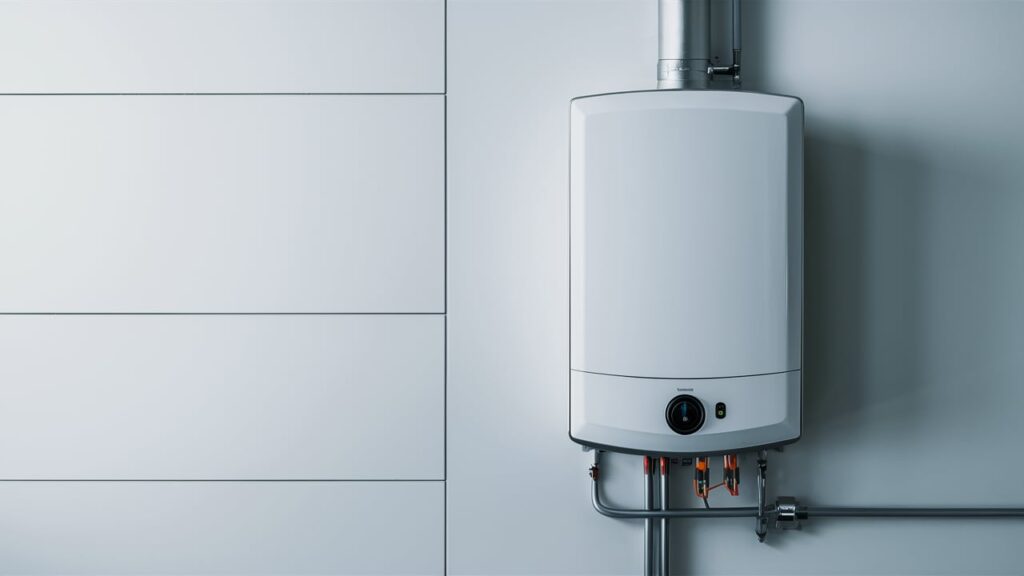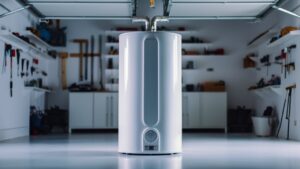Tankless water heaters are a great option for tiny houses due to their compact size and ability to provide hot water on demand. This type of water heater is a space-saving solution that can be powered by propane or electricity, making it an ideal choice for those living off the grid.
Recommended Best Tankless Water Heater 2025
| Recommendation | Product |
| Best Overall | Rheem 18kW 240V Tankless Electric Water Heater |
| Popular Choice | EcoSmart ECO 11 Electric Tankless Water Heater |
| Best Value | Rinnai Smart Sense Natural Gas or Propane Water Heater |
| Best Budget | ECOTOUCH Instant Hot Water Heater |
| Another Excellent Pick | Titan Electric Tankless Water Heater |
With tankless water heaters, you can enjoy hot water whenever you need it without the need for a bulky tank that takes up valuable space. However, it’s important to consider the upfront cost, access to fuel, flow rate limitations, and potential need for multiple units before deciding if a tankless water heater is the right choice for your tiny house.
Tiny Houses And Hot Water Needs
Tankless water heaters are a great fit for tiny houses due to their compact size and on-demand hot water supply. They are efficient and take up less space, making them ideal for meeting the hot water needs of tiny house dwellers.
Additionally, tankless water heaters are popular in tiny homes because they can be installed in small spaces and provide hot water as needed.
When it comes to tiny houses, every inch of space matters. That includes hot water systems. Traditional tank water heaters can take up valuable space in a tiny home, making tankless water heaters a popular choice. In this article, we will explore the space-saving advantages and on-demand hot water benefits of tankless water heaters for tiny houses.
Space-saving Advantages
One of the biggest advantages of tankless water heaters for tiny houses is their space-saving design. Unlike traditional tank water heaters, which can be bulky and require a dedicated storage area, tankless water heaters are compact and can be installed in tight spaces. This is particularly beneficial for tiny homes, where every square inch counts.
With a tankless water heater, you can free up valuable floor space that would otherwise be occupied by a large water tank. This extra space can be utilized for storage, additional living areas, or even a larger bathroom.
On-demand Hot Water Benefits
In addition to their space-saving advantages, tankless water heaters offer on-demand hot water benefits that are perfect for tiny houses. With a tankless system, you can enjoy hot water whenever you need it, without the need to wait for a large tank to heat up.
Traditional tank water heaters store a limited amount of hot water, which can be quickly depleted if multiple hot water sources are used simultaneously. This can be especially challenging in tiny houses, where space constraints often mean fewer bathrooms and appliances.
Tankless water heaters, on the other hand, heat water as it passes through the unit, providing a continuous supply of hot water. This means that you can take a shower, wash dishes, and do laundry all at the same time without worrying about running out of hot water. This on-demand hot water feature is not only convenient but also energy-efficient, as it eliminates the need to constantly keep a large tank of water heated.
Whether you are looking to maximize space or enjoy the benefits of on-demand hot water, tankless water heaters are a great option for tiny houses. Their space-saving advantages and on-demand hot water benefits make them a practical and efficient choice for those living in limited square footage.
Comparing Tankless To Traditional Water Heaters
Tankless water heaters are a great option for tiny houses due to their compact size and on-demand hot water capabilities. They may have higher upfront costs compared to traditional tank water heaters, but they provide a more efficient and convenient solution for limited hot water needs.
Cost Analysis
When considering tankless water heaters for tiny houses, it’s essential to weigh the cost implications. Tankless water heaters generally have higher upfront costs compared to traditional tank water heaters. However, they are more energy-efficient, resulting in long-term cost savings on utility bills.
Installation Considerations
Installation of tankless water heaters in tiny houses requires careful consideration. While they take up less space and can be mounted on walls, they may need upgrades to the electrical system or gas lines. This can impact the overall installation cost and should be factored in when making the decision.
Energy Efficiency And Eco-friendliness
When considering a tankless water heater for a tiny house, it’s essential to evaluate its energy efficiency and eco-friendliness. These factors play a crucial role in minimizing the environmental impact while ensuring cost-effective operation.
Energy Consumption Patterns
Tankless water heaters are renowned for their energy efficiency due to their on-demand heating mechanism. Unlike traditional water heaters, tankless models only heat water when it’s needed, eliminating standby energy losses. This results in lower energy consumption and reduced utility bills.
Environmental Impact
Tankless water heaters contribute to a reduced environmental impact compared to conventional water heaters. By consuming less energy and minimizing waste, these units help in lowering the carbon footprint and promoting sustainability.
Sizing And Flow Rate Challenges
Installing a tankless water heater in a tiny house presents sizing and flow rate challenges. Due to limited space and water usage, finding a unit that meets the demand while fitting in the small area can be tricky. Additionally, ensuring proper flow rate for consistent hot water supply is essential for a tankless water heater to be effective in a tiny house.
Determining The Right Size
When it comes to tankless water heaters for tiny houses, one of the major challenges is determining the right size. Unlike traditional tank water heaters, tankless heaters are sized based on their flow rate, measured in gallons per minute (GPM). In order to ensure that your tankless water heater can meet your hot water demands, it is important to consider factors such as the number of fixtures in your tiny house and the maximum hot water usage at any given time.
Understanding Flow Rates
Flow rates play a crucial role in the performance of tankless water heaters in tiny houses. These flow rates determine the amount of hot water that can be delivered by the heater at a given time. It is essential to choose a tankless water heater with a flow rate that matches the hot water demands of your tiny house. This requires careful consideration of the number and types of fixtures, such as faucets and showers, in your tiny house.
Flow Rate Challenges
One of the challenges with tankless water heaters in tiny houses is that they may have limitations in terms of flow rates. Depending on the model and size of the tankless water heater, it may not be able to provide hot water at a high enough flow rate to meet the simultaneous demands of multiple fixtures. This can be a concern, especially if you have a tiny house with limited space and only one tankless water heater installed.
To overcome this challenge, it may be necessary to install multiple tankless water heaters or consider using low-flow fixtures to reduce the overall hot water demand. Additionally, it is important to choose a tankless water heater with a flow rate that can adequately meet the hot water needs of your tiny house.
In conclusion, sizing and flow rate challenges are important factors to consider when choosing a tankless water heater for a tiny house. By determining the right size and understanding flow rates, you can ensure that your tankless water heater can meet your hot water demands and provide a comfortable living experience in your tiny house.
Fuel Types And Availability
Tankless water heaters are a great option for tiny houses due to their compact size and on-demand hot water capabilities. They provide an efficient and space-saving solution for limited hot water needs. With various fuel types available, such as electric or propane, tankless water heaters offer flexibility and convenience for tiny house owners.
Fuel Types and Availability
When it comes to choosing a tankless water heater for your tiny house, one important factor to consider is the fuel type. The most common fuel types for tankless water heaters are propane and electric. Each has its pros and cons, so it’s essential to understand your options and choose the one that best fits your needs.
Propane vs Electric Heaters
Propane tankless water heaters are a popular option for tiny houses because they are more energy-efficient than electric models. They are also more compact, making them a great option for small spaces. Additionally, propane is widely available, making it an easy fuel source to find in most areas.
Electric tankless water heaters, on the other hand, are more affordable upfront and do not require a gas line or propane tank, making them easier to install. However, they are less efficient than propane models, which means they may not be ideal for those who rely heavily on hot water.
Fuel Accessibility in Remote Areas
If you plan to live in a remote area, it’s important to consider the availability of fuel for your tankless water heater. Propane is a popular fuel source for those living off the grid, as it can be delivered to your location in tanks. However, it’s important to note that propane delivery can be expensive in remote areas.
Electricity may not be readily available in remote locations, making electric tankless water heaters less practical for those living off the grid. In this case, propane tankless water heaters may be a better option, as they can be powered by a generator or solar panels.
In conclusion, when choosing a tankless water heater for your tiny house, it’s important to consider the fuel type and availability in your area. Propane and electric tankless water heaters each have their advantages and disadvantages, so it’s essential to weigh your options carefully before making a decision.
Maintenance And Longevity
Tankless water heaters can be a great option for tiny houses as they are compact and provide hot water on demand. However, it’s important to consider maintenance and longevity factors before making a decision. It’s recommended to choose a reliable, on-demand propane hot water heater or electric tankless water heater that can meet the specific needs of a tiny house.
Routine Upkeep
One of the benefits of tankless water heaters for tiny houses is that they require less maintenance than traditional tank water heaters. However, routine upkeep is still necessary to ensure the longevity of the unit. The manufacturer’s instructions should be followed for regular maintenance, which may include flushing the unit to remove any mineral buildup and checking for any leaks.
Durability And Life Expectancy
Tankless water heaters are known for their durability and longevity. With proper maintenance, a tankless water heater can last up to 20 years or more. This is significantly longer than the average lifespan of a traditional tank water heater, which is around 10-15 years. Additionally, tankless water heaters are less prone to leaks and water damage since they do not store water.
When considering the durability and life expectancy of a tankless water heater, it is important to choose a unit that is appropriate for the size of the tiny house and the number of occupants. It is also important to ensure that the unit is installed correctly by a professional plumber to avoid any potential issues.
In conclusion, tankless water heaters are a great option for tiny houses due to their space-saving design, energy efficiency, and on-demand hot water. With proper maintenance and installation, tankless water heaters can provide hot water for years to come.
Real User Experiences In Tiny Houses
Real user experiences in tiny houses have shown that tankless water heaters are a good option. They provide on-demand hot water and save space, which is important in a tiny house. However, they can have higher upfront costs and flow rate limitations, so it’s important to consider the specific needs of your tiny home before making a decision.
When it comes to choosing the right water heater for a tiny house, hearing from real users who have already installed tankless water heaters can provide valuable insights. Let’s take a look at some case studies and community recommendations to understand if tankless water heaters are good for tiny houses.
Case Studies
In a YouTube video by Pacifica Tiny Homes, they demonstrate the installation of a tankless water heater in a tiny house. The video shows the process of plumbing, attaching clamp rings, connecting the propane line, and installing a heat deflector. This case study provides a visual representation of how a tankless water heater can be integrated into a tiny house setup.
Another case study worth mentioning is the tankless water heater offered by B & K Titan, available at Home Depot for $234.77. This product has received positive reviews from users who have installed it in their tiny houses. The affordability and performance of this tankless water heater make it a popular choice among tiny house owners.
Community Recommendations
When it comes to community recommendations, Rheem Tankless Heaters are highly recommended by users. Available for $889.95 with free delivery on tractorsupply.com, these tankless water heaters have proven to be reliable and efficient for tiny house living. Users have praised the durability and consistent hot water supply provided by Rheem Tankless Heaters.
On the other hand, some users have expressed their concerns about the downsides of tankless water heaters. Higher upfront costs, access to fuel, water softener requirements, flow rate limitations, and the need for multiple units are some of the disadvantages mentioned by users. However, these drawbacks can be mitigated by careful planning and choosing the right tankless water heater for your tiny house.
In conclusion, real user experiences in tiny houses show that tankless water heaters can be a good option. By considering case studies and community recommendations, you can make an informed decision on whether a tankless water heater is suitable for your tiny house.
Future Trends In Tiny House Heating
Tankless water heaters are a great heating option for tiny houses due to their compact size and on-demand hot water feature. They provide hot water when needed, saving space and energy compared to traditional tank water heaters.
Technological Advancements
One of the future trends in tiny house heating is the integration of advanced technologies in the form of tankless water heaters. These innovative systems are designed to provide on-demand hot water, offering a space-saving solution for tiny house dwellers. The technological advancements in tankless water heaters ensure efficient energy usage and consistent hot water supply, addressing the specific heating needs of tiny homes.
Shifts In Consumer Preferences
Another notable trend in tiny house heating is the shift in consumer preferences towards tankless water heaters. With an increasing emphasis on sustainability and energy efficiency, homeowners are opting for tankless water heaters due to their eco-friendly operation and reduced energy consumption. This shift reflects the growing awareness and preference for compact, energy-efficient heating solutions in tiny house living.

Frequently Asked Questions
What Are The Downsides To A Tankless Water Heater?
Tankless water heaters have higher upfront costs and may require access to specific fuel types. Additionally, they may have flow rate limitations and might need multiple units for larger households.
Is A Tankless Water Heater A Good Idea For A Mobile Home?
A tankless water heater is a good idea for a mobile home. It provides on-demand hot water and is compact, making it suitable for small spaces. Additionally, it eliminates the need for a bulky storage tank, saving space. However, it may have higher upfront costs compared to traditional tank water heaters.
Can I Replace My 40 Gallon Water Heater With A Tankless Water Heater?
Yes, you can replace your 40 gallon water heater with a tankless water heater.
Why Don T More People Use Tankless Water Heaters?
Tankless water heaters have higher upfront costs and may require retrofitting. They also have efficiency limitations and maintenance challenges, making them less popular than traditional tanked heaters.
Conclusion
Tankless water heaters are a great option for tiny houses due to their compact size and ability to provide hot water on demand. They may have higher upfront costs compared to tank water heaters, but they offer advantages such as energy efficiency and space-saving benefits.
With proper installation and maintenance, tankless water heaters can provide a reliable and efficient hot water solution for tiny house owners. Consider your specific needs and consult with professionals to determine the best tankless water heater for your tiny house.







